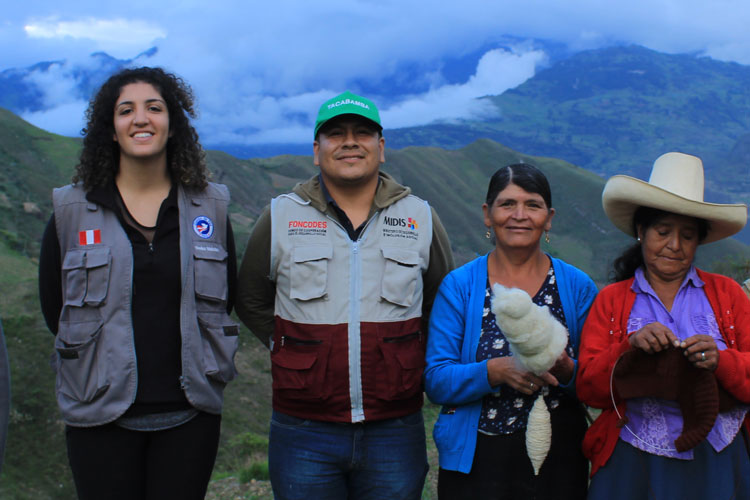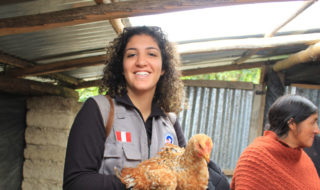UC Berkeley rises in Peace Corps rankings, remains all-time top volunteer producer
Longstanding tradition of public service and growth experience overseas remains strong

February 26, 2020

Neeka Mahdavi, second from left, a UC Berkeley graduate in economics, is a Peace Corps volunteer in Peru. (Photo courtesy of the Peace Corps)
Neeka Mahdavi, a UC Berkeley graduate in economics, recalls being riveted by stories that returning Peace Corps volunteers told in a student-run DeCal class. Now, three years later, she’s a Peace Corps volunteer in the northern Andean mountains of Peru with plenty of her own adventures to relay.
“One of the highlights has been working with female artisans who use backstrap looms to weave beautiful handmade textiles, “ said Mahdavi, an Iranian American from Danville, California. “Together we’ve been able to trademark their brand, market and sell their products online, and travel to fairs together to sell their handicrafts.”
Mahdavi is one of 56 Berkeley graduates currently serving worldwide in the Peace Corps. Her commitment to public service may be part of the reason the campus has jumped two spots to place 9th among large U.S. colleges and universities with the highest numbers of current Peace Corps volunteers.
In addition to rising in this year’s rankings, UC Berkeley retains its title as the nation’s all-time top producer of Peace Corps volunteers, with 3,741 graduates volunteering since the U.S. government organization’s inception in 1961, according to a report released today (Wednesday, Feb. 26).
“It’s really heartening to see that, for nearly 60 years, Berkeley students have maintained such a strong commitment to serving our global community through their engagement with the Peace Corps,” said Sandra Bass, associate dean of students and director of Berkeley’s Public Service Center, which coordinates student volunteer opportunities.
As it did last year, the University of Wisconsin-Madison tops this year’s Peace Corps rankings with 79 alumni currently serving. Rounding out the top five are the University of Florida, with 70 volunteers; the University of Virginia, with 68; the University of Maryland, with 66; and the University of Georgia, with 64.
Two other University of California campuses made the top 25 — UCLA, placing 21st, and UC Davis, at 23rd.
Last year, UC Berkeley ranked 11th, so its return to the top 10 is encouraging for Peace Corps recruiters like Kerry Carmichael, who holds office hours at Berkeley’s Career Center each Thursday to advise students about the program, its requirements and how to prepare for their assignments.

Mahdavi’s Twitter profile image shows a globe with the definition of “Wanderlust.”
“It’s clear to me that UC Berkeley faculty and staff instill a global perspective in their students, as well as an ethos of making a difference in the world,” said Carmichael, a regional recruiter and former Peace Corps volunteer in Ecuador. “So, it’s no surprise that so many Cal students are attracted to Peace Corps’ two-year service commitment.”
President John. F. Kennedy founded the Peace Corps in 1961 to promote understanding and cooperation between Americans and people in the developing world. Volunteers receive three months of training and then serve two years in their assigned countries.
Overall, more than 240,000 Americans of all ages have served in 142 countries with the Peace Corps.
In terms of the highest all-time producers of volunteers, the University of Wisconsin-Madison is second to Berkeley, with 3,369 alumni volunteers, but it is gradually catching up. It is followed by the University of Washington, with 3,101 volunteers; the University of Michigan, with 2,775; and the University of Colorado, with 2,556.
“These schools are institutions that emphasize being global citizens and service-minded students,” said Peace Corps Director Jody Olsen, who served in Tunisia from 1966 to 1968.
In recent years, the UC has made a concerted effort to send more of its graduates into the Peace Corps by offering a Peace Corps Prep certificate program through Education Abroad. Undergraduates in that program get trained for international development fieldwork.
The overseas experience can dramatically change Peace Corps volunteers’ career trajectories. Take Melody Jingyi Wei, a Berkeley graduate in molecular and cell biology who returned from her two-year stint in Tanzania last fall. She decided to earn a graduate degree in education instead of pursuing pre-med.
In addition to teaching high school physics in Tanzania, Wei got involved in the students’ soccer team, helped plant 400 avocado trees and, as part of sex education efforts, provided reusable menstrual pads to girls who would otherwise miss school when they were on their periods.
“It was difficult to accomplish my teaching goals in a culture that was so different than mine, but I kept an open mind and recognized that just because a culture is different doesn’t make people’s way of doing things any less valuable,” Wei said. “I was challenged to come up with creative ways of reaching my goals and, in the end, discovered my passion for education and my ability to create a bridge between cultures.”
For UC Berkeley students interested in the Peace Corps, regional recruiter Kerry Carmichael holds office hours at the campus’s Career Center on Thursdays and can be reached at [email protected].
